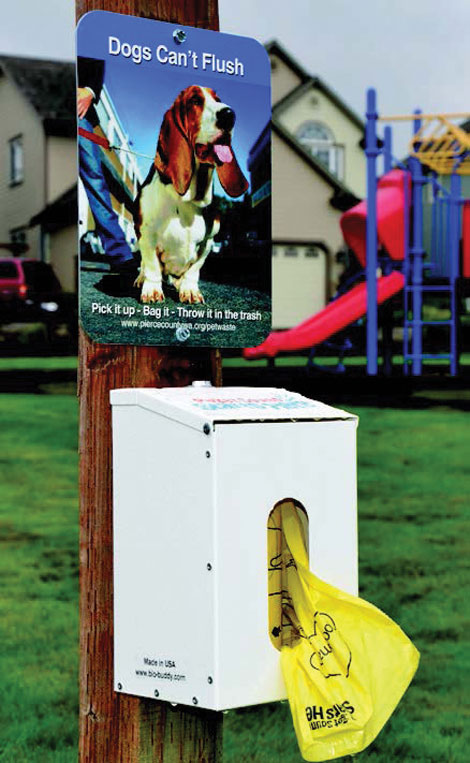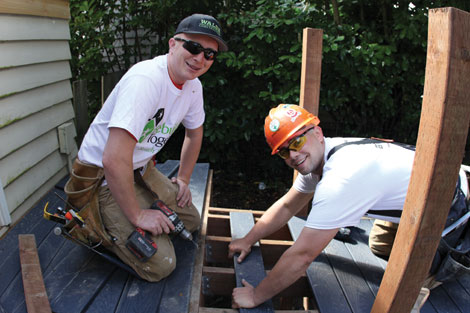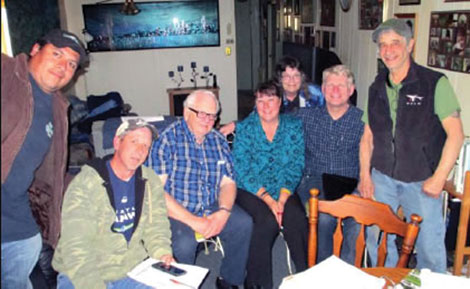Note to dog owners: ‘Do your doody’
Dog waste that isn’t picked up and disposed of by owners is a source of pollution for stormwater runoff, says Shauna Hansen, public education and outreach coordinator for the Surface Water Management division for the city of Tacoma.
“We’ve promoted this message for a long time,†said Hansen. “No matter the size of the deposit, it will pollute local waterways because pet waste has harmful bacteria in it that contributes to water-quality problems when it washes into storm drains.â€
The city’s dog waste law, which was passed in 2007, states, “It is a violation for any person to fail to immediately remove fecal matter deposited by a dog or other animal in his or her possession on public property such as park property, school grounds, public rights-of-way, or public easements or on private property that does not belong to the animal’s owner or custodian.†Violators are subject to a fine of $250.
One effort to help pet owners be responsible and meet the law by scooping their pet’s poop is Tacoma’s Neighborhood Dog Waste Station program. The city is piloting this program with a goal of installing 20 bag stations throughout the city by the end of the year.
Each station has a sign depicting a friendly pooch with a call to “Do your doody†and provides dog owners with bags to scoop their pet’s waste and dispose of it properly in the trash.
“Pierce County started this program a few years ago, and we are just starting it in Tacoma this year,†said Hansen.
The program relies on individual homeowners who are encouraged to sponsor a station in their neighborhood.
“The sponsor applies for a bag station free of charge, and we install it in a publicly accessible location in their neighborhood where pet waste is a problem,†Hansen said. “Then they are responsible for monitoring the station and restocking the bags when the initial rolls of bags run out. The sponsors can reuse any type of extra plastic bags they collect at home, and that’s one of the reasons we like this station design.â€
Neighborhoods that would like to sponsor a bag station in their area can call Hansen at 253-502-2284 or get more information and an application form at www.cityoftacoma.org/scoopywatch.
Scoopy Doo, a dog-costumed mascot who loves Puget Sound, attends community events and encourages pet owners to be responsible with their dog’s waste. The events are fun for kids, especially the poop toss game where kids can win a prize by tossing baggies into a tin can.
“I think it’s most effective to keep a sense of humor when talking to folks about this topic,†said Hansen.
Joey Furuto, community and neighborhood parks manager for Metro Parks Tacoma, said all dog parks in Tacoma have dog bags available, as well as signs alerting dog owners to be sure to be responsible with their pet’s waste.
“We train our staff, and they have cards that they pass out to dog owners who aren’t going by the rules. The cards have a few facts about picking up waste or putting dogs back on the leash,†he said.
Furuto noted that when people don’t follow the poop-and-scoop rules, it affects all parkgoers and maintenance staff. Officials encourage visitors to scoop up the poop and dispose of it in the garbage (in plastic bags) or flush it down the toilet.
Stressing that 90 percent of dog owners follow the rules, Furuto said Metro Parks likes to say that park staffs educate and Tacoma Police Department does the enforcement.
Furuto said waste on the ground is unsightly, pollutes the water and poses a health risk for pets and people, especially children.
Metro Parks has partially fenced off-leash areas and fully fenced dog parks. More information about the dog parks is at http://www.metroparkstacoma.org/dogs/.



